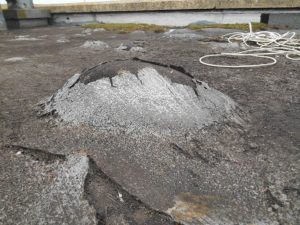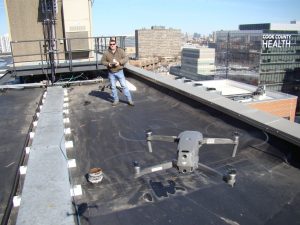
Many facilities often go year after year without a proper, comprehensive roof inspection. Managers may assume that the roof is sound and even ignore obvious issues, which will only proceed to become more and more severe.
Symptoms such as cracking, ponding water, and accumulated debris can indicate a significant problem. Regular, proper inspections of your roof can head off a more expensive repair in the future.
Thermal Imaging for a Thorough Roof Inspection

The practice of thermal imaging has become increasingly more common in regards to roof inspection practices. By scanning various areas of the roof with thermal cameras, you can identify where hidden issues may be lurking.
Conditions such as moisture intrusion, mold, heat or cooling loss, and construction quality can easily be determined when using thermal imaging of a roof.
The advantages of thermal imaging are multi-faceted. For instance, the process is non-intrusive, allows detection of issues before damage occurs, and gives the inspector the ability to scan large areas quickly.
Repairs to an extensively damaged roof can be quite costly. This cost is highlighted further when compared against that of a regular inspection. Money can be saved in the long run by performing thorough and regular inspections of your roof, rather than waiting until the damage has already been done.
Neglect tends to be the most common cause of roof failure, as most significant problems can be prevented. It is easy to assume that a roof is invincible, but unfortunately that is not the case, as they are prone to many issues such as ponding water, debris accumulation, exposure, and cracking.
Other common issues include:
- Organic growth: Weed and plant roots can actually penetrate into the roof, which can cause damage.
- Heat absorption: Components of the roof that have absorbed water will cool off more slowly. This leads to dusk being the best time to thermally examine a roof, as the “hot spots” have not cooled down as much as other areas.
- Ponding: The result of poor drainage, ponding is standing water that remains on a roof after 48 hours. The water can find its way into imperfections in the roof, and degrades the materials inside.
- Parapets: Can be a problematic source of water intrusion. Materials that have been exposed to moisture, sunlight, and UV exposure can crack and split, allowing water an easy path into the inside of the building envelope.
- Rusted supports: Can contribute to damage or falling pieces of your building envelope. Lightning strikes have been known to hit sensitive areas of a roof or facade and cause massive chunks to fall to the ground below.
Use the IEI Advantage to Protect Your Roof
A roof inspection is recommended twice a year – primarily right before and after winter. However, if your roof is subject to severe weather such as a hailstorm or hurricane, it may be prudent to schedule an inspection to assess any potential damage that may have been caused.
Innovative Engineering Inc.’s Certified Remote Pilots comply with FAA Part 107 Guidelines. They also hold a daylight operations waiver which allows them to fly at night, which is the best time to conduct thermal inspection.
The engineers at IEI have extensive experience with various methods of roof inspection. If you feel that it is time to address any problems (either potential or already confirmed) with the roof of your facility, give IEI a call today. Their engineers will be happy to provide you with a detailed report of any deficiencies that need to be addressed. Contact us today!
